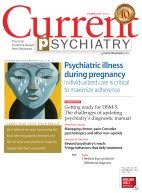skip to main |
skip to sidebar
 A one-day psychopharmacology symposiumSave the date!Saturday, October 23, 2010, 7:45 am – 5:00 pmKingsgate Marriott Conference Hotel*Cincinnati, Ohio
A one-day psychopharmacology symposiumSave the date!Saturday, October 23, 2010, 7:45 am – 5:00 pmKingsgate Marriott Conference Hotel*Cincinnati, Ohio
Join us for this interactive, live symposium where nationally renowned faculty will address:
- Treatment Resistant Depression: A Multi-Functional Pharmacologic Approach
- The Philosophy, Process, and Application of Evidence-Based Psychopharmacology
Symposium Director
Henry Nasrallah, MD
Professor of Psychiatry and Neuroscience
University of Cincinnati College of Medicine
Faculty
Stephen M. Stahl, MD, PhD
Adjunct Professor of Psychiatry
University of California, San Diego
Leslie Citrome, MD, MPH
Professor of Psychiatry
New York University School of Medicine
*A discounted room rate will be available for participants of the Psychopharmacology Update.
Email Updates
To receive email updates about this conference directly to your inbox, please contact: kathy.wenzler@qhc.com
To receive a copy of the invitation to this conference please send your full name and address to: kathy.wenzler@qhc.com
David R. Spiegel, MD, Associate professor, Department of psychiatry and behavioral sciences, Director of consultation-liaison services, Eastern Virginia Medical School, Norfolk, VA
Daiana Radac, MD, Resident, Eastern Virginia Medical School, Norfolk, VA Benzodiazepines are the mainstay of alcohol detoxification treatment, with extensive evidence supporting their efficacy and relative safety. The risk of benzodiazepine-alcohol interaction, however, and psychomotor and cognitive impairments associated with benzodiazepine use may limit early rehabilitation efforts in hospitalized patients. Cross-tolerance with alcohol also limits benzodiazepines’ potential benefit in outpatients with substance use disorders.Adding anticonvulsants to acute benzodiazepine therapy has been shown to decrease alcohol withdrawal symptom severity, reduce seizure risk, and support recovery, particularly in patients with multiple alcohol withdrawal episodes. After detoxification, long-term anticonvulsant use may reduce relapse risk by decreasing post-cessation craving, without abuse liability.Although not all studies endorse adding anticonvulsants to benzodiazepines for managing alcohol withdrawal syndrome (AWS), we present 3 cases in which anticonvulsants were used successfully as adjuncts to lorazepam. Valproic acid, levetiracetam, and gabapentin offer advantages in acute and long-term therapy of alcohol dependence with efficacy in AWS, low abuse potential, benign safety profile, and mood-stabilizing properties.Read full text (free access)
Comment on this article
Email the editor
Steven C. Dilsaver, MD, Comprehensive Doctors Medical Group, Inc., Arcadia, CA Major depressive disorder (MDD) and bipolar spectrum disorders are associated with some symptoms of—and fully defined—posttraumatic stress disorder (PTSD). Many traumatic experiences can lead to this comorbidity, the most common being exposure to or witnessing combat for men and rape and sexual molestation for women.Trauma has major prognostic and treatment implications for affectively ill patients, including those whose symptoms do not meet PTSD’s full diagnostic criteria. This article aims to help clinicians by:- presenting evidence characterizing the overlap between affective disorders and PTSD
- reviewing evidence that the bipolar spectrum may be broader than generally thought, an insight that affects PTSD treatment
- making a case for routine PTSD screening for all patients with affective illnesses
- recommending PTSD treatments tailored to the patient’s comorbid affective disorder
Read full text (free access)
Comment on this article
Email the editor
 Henry A. Nasrallah, MD
Henry A. Nasrallah, MD
Editor-in-Chief
Psychiatry is one of the most rapidly evolving medical disciplines. Its scientific foundation is neuroscience, which is growing at the most explosive pace in science. Yet the public and even other medical specialists still envision psychiatrists sitting behind a couch scribbling Freudian jargon on a yellow pad. For that reason, I propose that we create a manifesto that promulgates the basic tenets of psychiatry and make it a permanent, living document on CurrentPsychiatry.com.
So I present my initial iteration of a psychiatric manifesto here. I invite all readers and CurrentPsychiatry.com visitors to suggest valid additions and/or modifications. I will serve as the custodian and editor of the manifesto, in charge of its continuous update as a living document
 A one-day psychopharmacology symposium
A one-day psychopharmacology symposium

